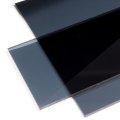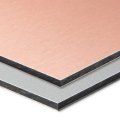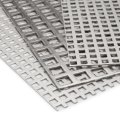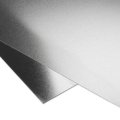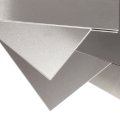Acrylic glass - cut to size
Would you like to draw attention to your company with a sign, create an individual mobile phone holder or frame the poster of the last concert you attended? Acrylic glass is the ideal construction material for your ideas. Our cutting service brings the sheets to the size of your choice and you can get started straight away.
What is acrylic glass?
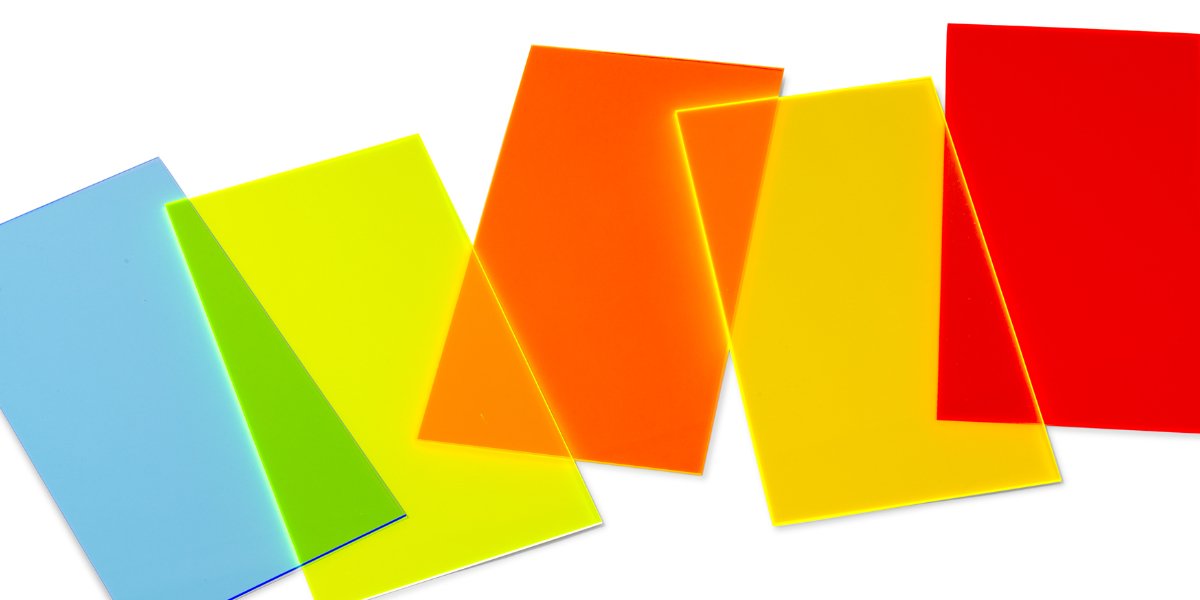
Contrary to what the name suggests, acrylic glass is not mineral glass, but an organic plastic. The correct name is polymethyl methacrylate (PMMA). However, the trade name by which acrylic glass became known, registered by Otto Röhm in 1933, is often used synonymously: PLEXIGLAS®.
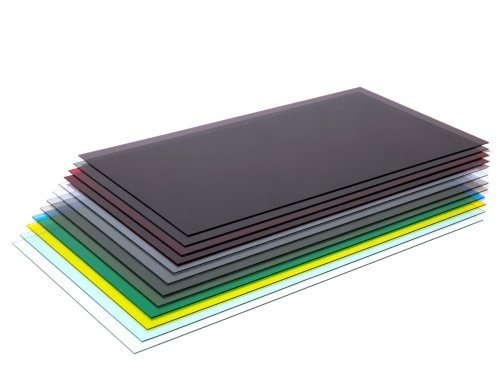
Properties of the plastic
Artificial glass sheets are light, break-proof, translucent as well as UV and weather resistant. They are a very good light conductor and can even be reshaped when exposed to heat. The offer for your acrylic glass cut ranges from transparent to satinised to coloured and reflective qualities.
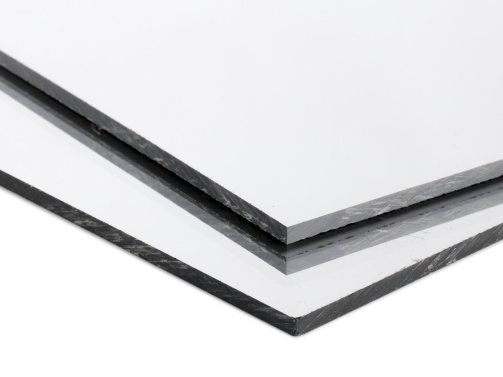
Practical tip: Due to their stable nature, plastics are ideal for areas where children spend time. With a floor-to-ceiling mirror made of acrylic glass XT mirror, silver, smooth, risk-free fun in the children's room is pre-programmed. Alternatively, we can cut a mirrored DIBOND® panel to the size of your choice. It has a polyethylene (PE) core coated with aluminium and is also easy to work with. What's more, it is less susceptible to temperature fluctuations.
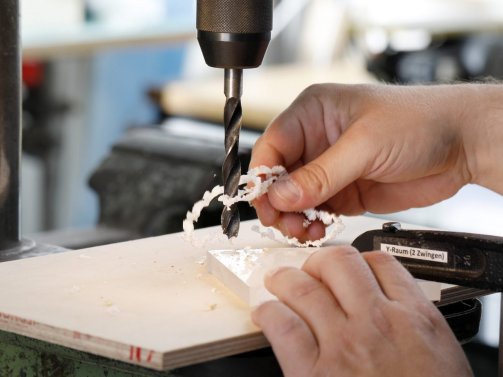
Acrylic glass cutting, drilling and co.
When implementing your ideas, there is one topic you cannot avoid: the processing possibilities. How do you cut acrylic glass? What options are there for shaping the plastic into the desired form? Are special tools necessary? And what do you have to consider in general?
Depending on the chosen variant and thickness, it is possible to score acrylic sheets with the help of a cutter or to shape them according to one's own ideas by sawing, milling, drilling, gluing and, and, and. Processing acrylic sheet is not witchcraft and you will find plenty of information, tips and tricks in our material database as well as in our magazine. Nevertheless, it can make sense to have acrylic glass cut to size. Why?
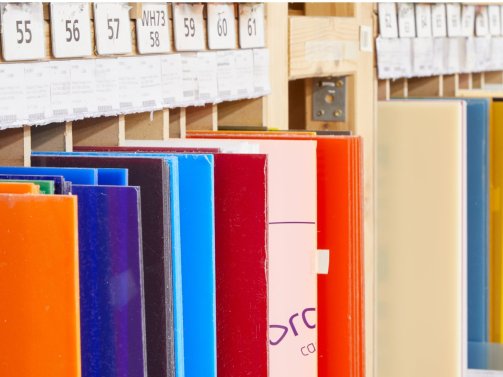
Acrylic glass from cutting - the all-round carefree package
To be able to cut acrylic glass cleanly, it is advisable to use carbide-tipped tools. The sheets are under tension and can break out if the load is too high. In addition, PMMA is a thermoplastic material. If it gets too hot, it melts. In addition to the right saw blade, the correct speed of the saw and the necessary know-how regarding the different acrylic glass qualities are also important when cutting. You can choose between acrylic glass GS and acrylic glass XT or cast and extruded sheets. The cast version is of higher quality and easier to cut. The variant formed from molten granulate with an extruder tends to melt more quickly during processing.
If you have the acrylic glass cut to size, you are on the safe side. The sheets are conveniently delivered to your home. So you can concentrate on preparing your project in peace.
Attention: Acrylic sheets expand when exposed to heat and moisture. When planning your cut, allow for an expansion gap of about 5 mm per metre of sheet.
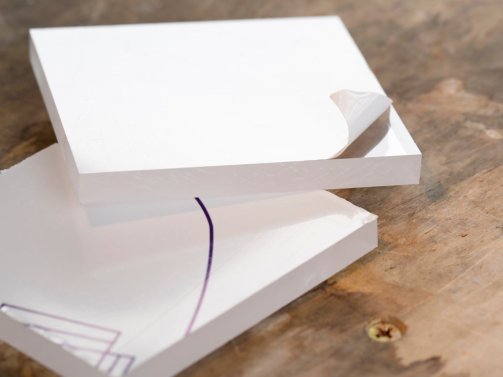
The post-processing of the acrylic glass blank
Acrylic glass from our cutting department arrives at your door with saw-cut edges. If you want to use our Plexiglas® XT, transparent, anti-reflective, for example, to frame your pictures, this is no problem. The uneven and milky edges usually disappear behind the borders of the frame. If, on the other hand, you use the material in the area of the lighting, the situation is different. For example, do you intend to use our acrylic glass GS transparent, coloured fluorescent to create the effect that the panel emits light at the edges? Or do you want to use the acrylic glass in model making? Then we recommend that you take a scraper, sandpaper and polishing paste to hand.
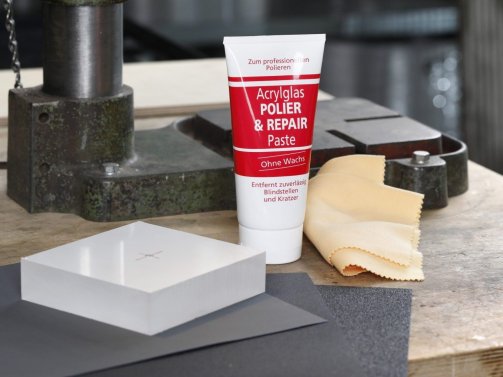
The finishing touch
In order to achieve smooth and clear edges, it makes sense to first smooth the edges of your acrylic cut-out with a scraper. If possible, the tool should be at a right angle to the plate. Then you can sand the acrylic. Moistened water sandpaper counteracts thermal stress. Work your way from a coarse-grained version to a fine one. If you have an acrylic cut from extruded sheets, it is advisable not to apply too much pressure. As already mentioned, the material reacts more strongly to heat.
For a crystal-clear result, you can polish your blank in the last step. Apply polishing paste with a soft polishing cloth or a buffing wheel. Smooth the material until the desired quality is achieved. Alternatively, a flame polish with a burner is possible, which melts away the grinding marks. This process requires some practice. We recommend that you practice on a test piece before you attempt to cut your acrylic glass.
Practical tip: It is advisable to leave the protective film on your PMMA blank as long as possible. This way you avoid damage and scratches. Nevertheless, small scratches cannot necessarily be avoided in the long run; here, too, the polishing paste will do a good job.
P.S. Our cutting service does not only cut plastics to your desired size. We also offer you the option of having wood and various sheet metals cut to size for your ideas.
Acrylic glass cutting - practical alternatives
Acrylic glass is not the only plastic that is suitable for implementing your ideas. Our PVC light box film is comparable to PLEXIGLAS® XT film LS translucent, white in terms of light transmission. There are also suitable alternatives made of polyvinyl chloride for framing pictures. If you are looking for thinner films, take a look at our translucent and colourful versions made of polypropylene. If you are interested in other plastic sheet or metal blanks, you will find an overview of our range here.

